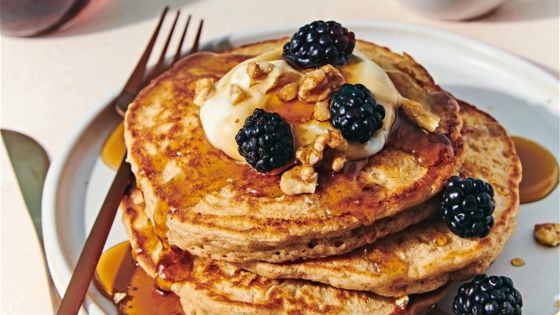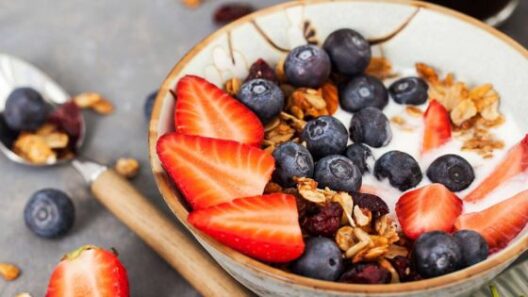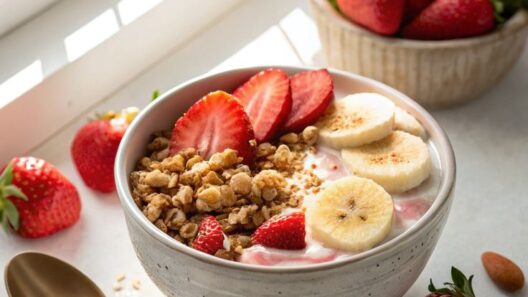Fuel Your Mornings, Lose Weight, and Stay Full Longer
Starting your day right sets the tone for everything that follows. And when it comes to weight loss, your breakfast matters more than you might think. Research shows that high-protein breakfasts (at least 20 grams of protein) can:
- Reduce hunger hormones like ghrelin
- Boost satiety hormones
- Improve metabolism and calorie burning
- Help you stick to your weight-loss goals
According to a 2025 survey by the International Food Information Council, 78% of Americans trying to lose weight focus on higher protein intake at breakfast.
Ready to take your mornings to the next level? Here are the 10 best high-protein breakfast ideas that are tasty, easy, and perfectly aligned with your weight-loss journey.
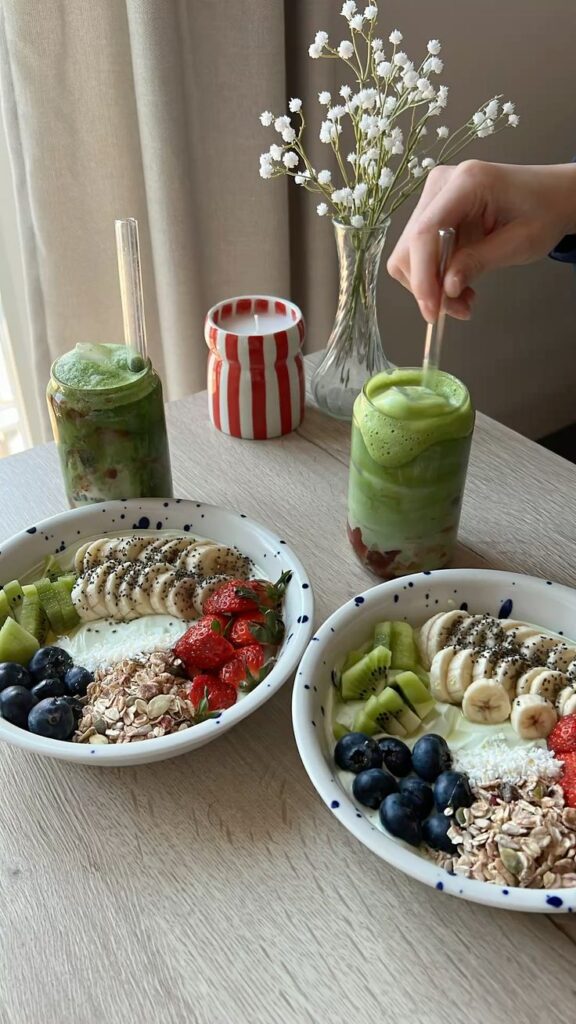
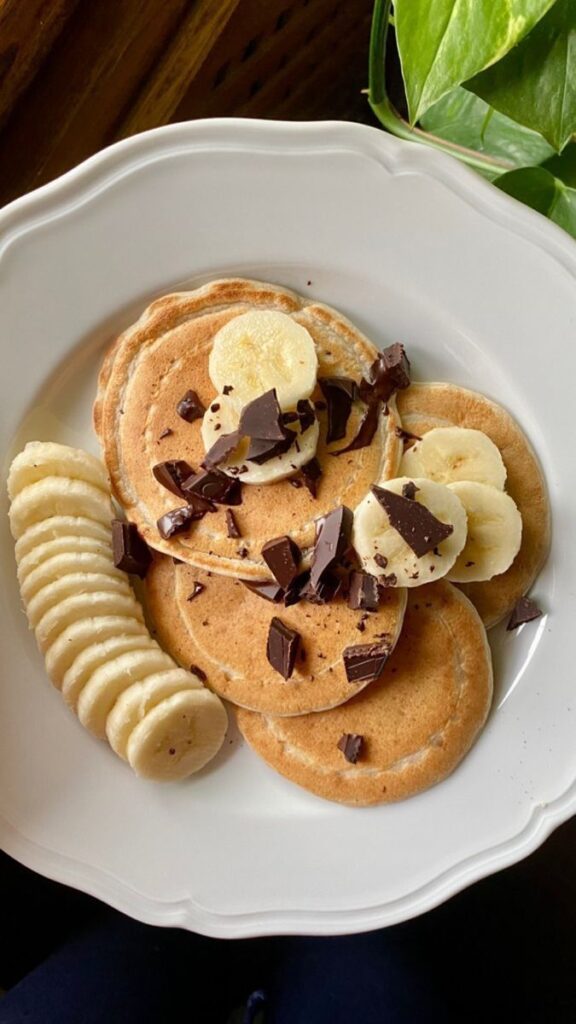
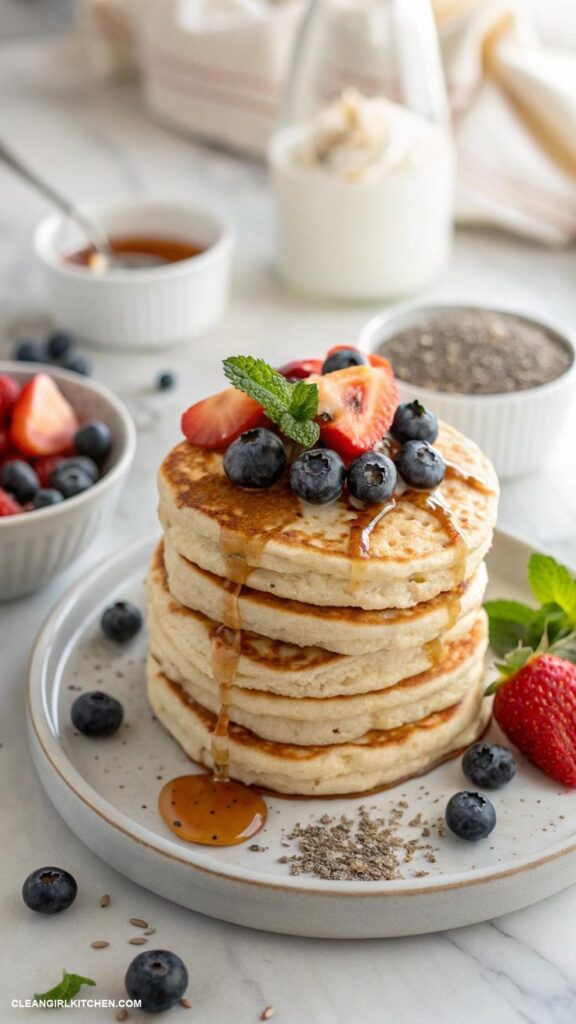
1. Greek Yogurt Parfait with Berries & Granola
Protein: ~20g | Calories: ~280 | Prep Time: 5 min
Greek yogurt is your protein-packed hero here. It delivers twice the protein of regular yogurt and comes with gut-friendly probiotics. To make it even better:
Ingredients:
- 1 cup nonfat Greek yogurt (≈17g protein)
- ½ cup fresh mixed berries
- 2 tbsp low-sugar granola
- 1 tsp honey (optional)
Why It Works:
- Protein keeps you full until lunch
- Berries add antioxidants and fiber
- Granola brings a satisfying crunch
Pro Tip: If you want to cut sugar, swap granola for crushed nuts or seeds.
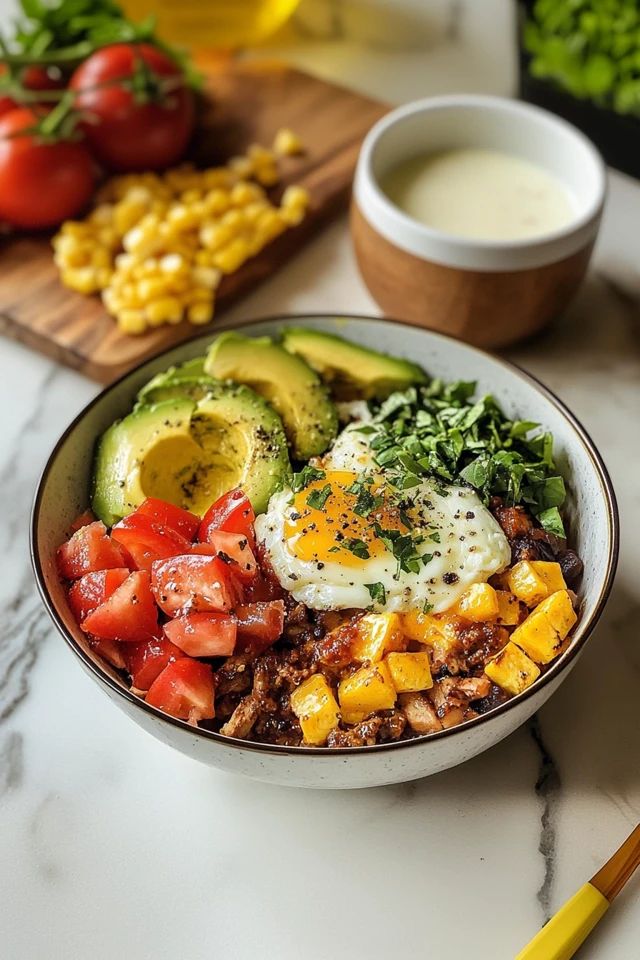
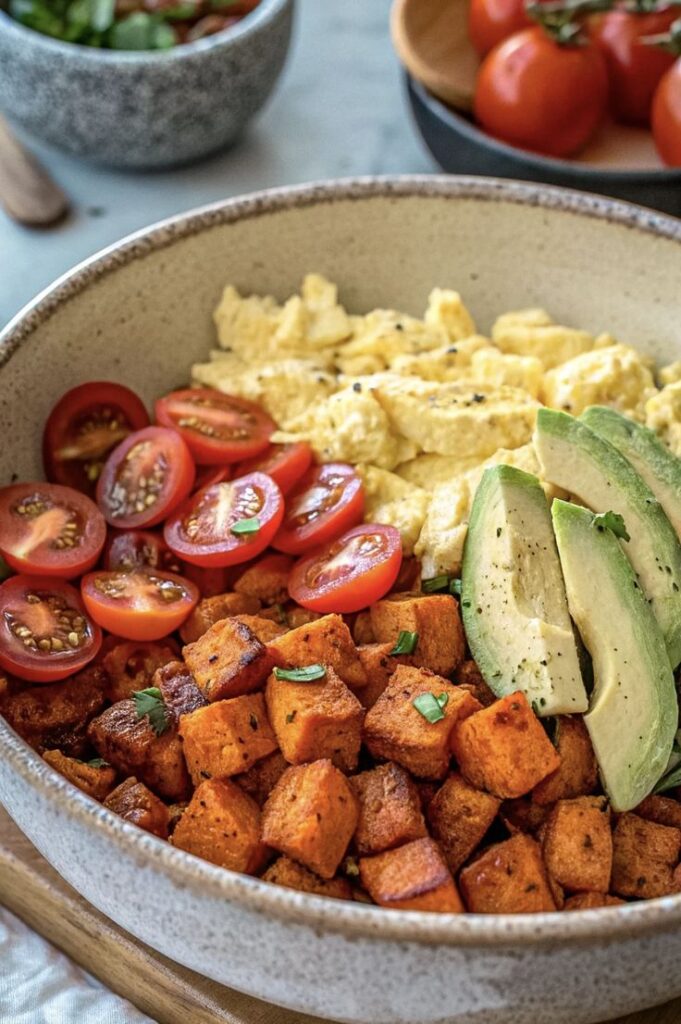
2. Protein Smoothie Bowl (or On-the-Go Shake)
Protein: 25g | Calories: ~300 | Prep Time: 3 min
For busy mornings, nothing beats a protein smoothie. But you can make it Instagram-worthy by turning it into a smoothie bowl.
Ingredients:
- 1 scoop whey or plant-based protein (20g)
- ½ cup unsweetened almond milk
- ½ frozen banana
- Handful spinach (optional)
- Toppings: chia seeds, coconut flakes, or berries
How It Helps Weight Loss:
- A smoothie bowl slows you down, helping mindful eating
- Fiber from toppings improves satiety
- You control sugar by using unsweetened milk
Variation: Swap whey for pea protein if you’re vegan—still get 20g+ protein easily.
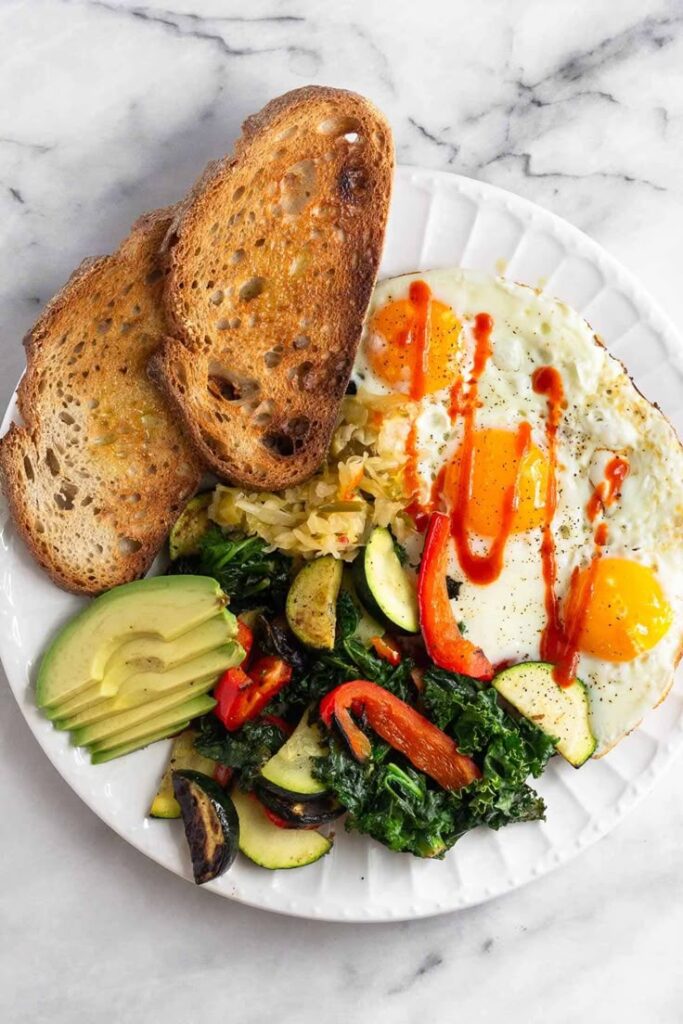
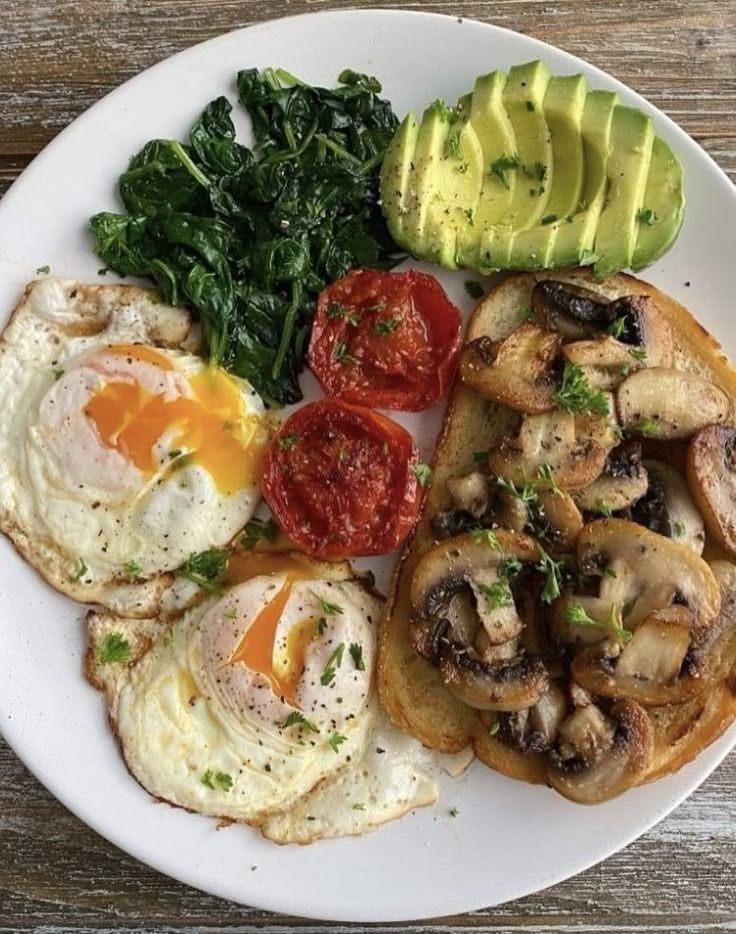
3. Egg Muffins with Veggies & Cheese
Protein: 15g (2 muffins) | Calories: ~220 | Prep Time: 25 min
These egg muffins are like mini omelets you can grab and go.
Ingredients:
- 4 large eggs (24g protein total)
- ½ cup chopped spinach
- ¼ cup diced bell peppers
- ¼ cup shredded cheddar (7g protein)
Instructions:
- Preheat oven to 350°F (175°C).
- Mix eggs, veggies, and cheese in a bowl.
- Pour into muffin tins and bake for 15–18 mins.
Why It Works:
- Perfect for meal prep—make a batch on Sunday
- Keeps you full until lunch
- Packed with protein + fiber
Pro Tip: Add turkey bacon or lean chicken sausage for extra 7g protein per muffin.
4. Overnight Oats with Protein Boost
Protein: 22g | Calories: ~300 | Prep Time: 5 min + overnight soak
If you’re always rushing in the morning, overnight oats are your best friend.
Ingredients:
- ½ cup rolled oats
- 1 cup milk (dairy or soy for extra protein)
- 1 scoop vanilla protein powder
- 1 tbsp chia seeds
- ½ cup strawberries
Nutrition Boosters:
- Protein powder raises the protein content
- Chia seeds provide omega-3s and fiber
- Oats give slow-release carbs
Make It Yours: Experiment with peanut butter, cocoa powder, or sugar-free chocolate chips.
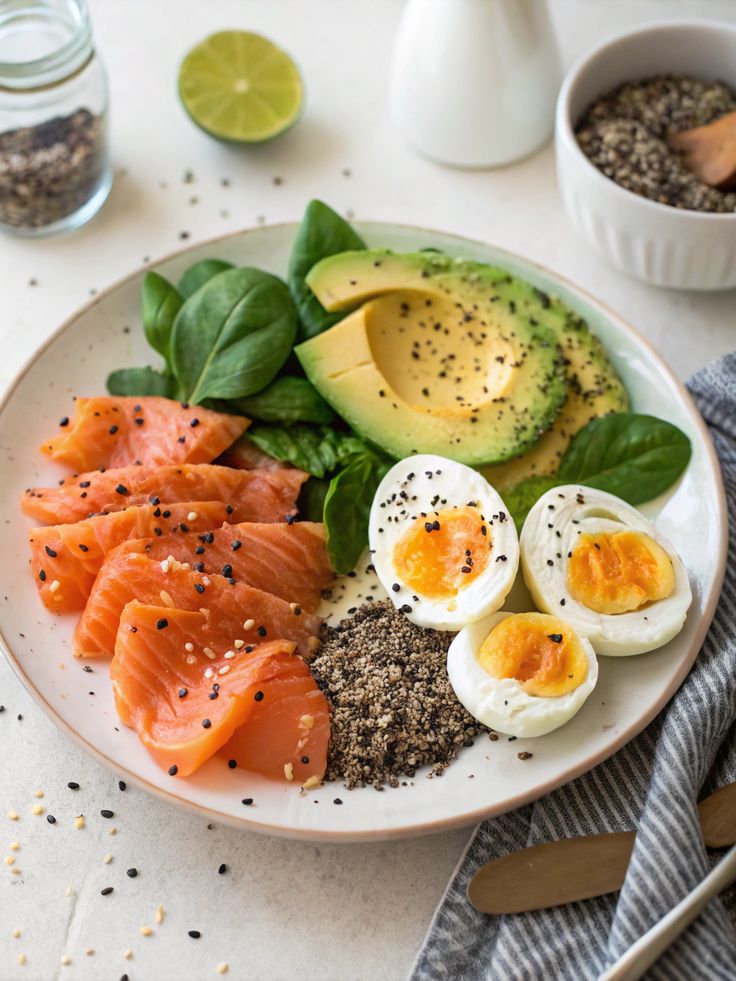
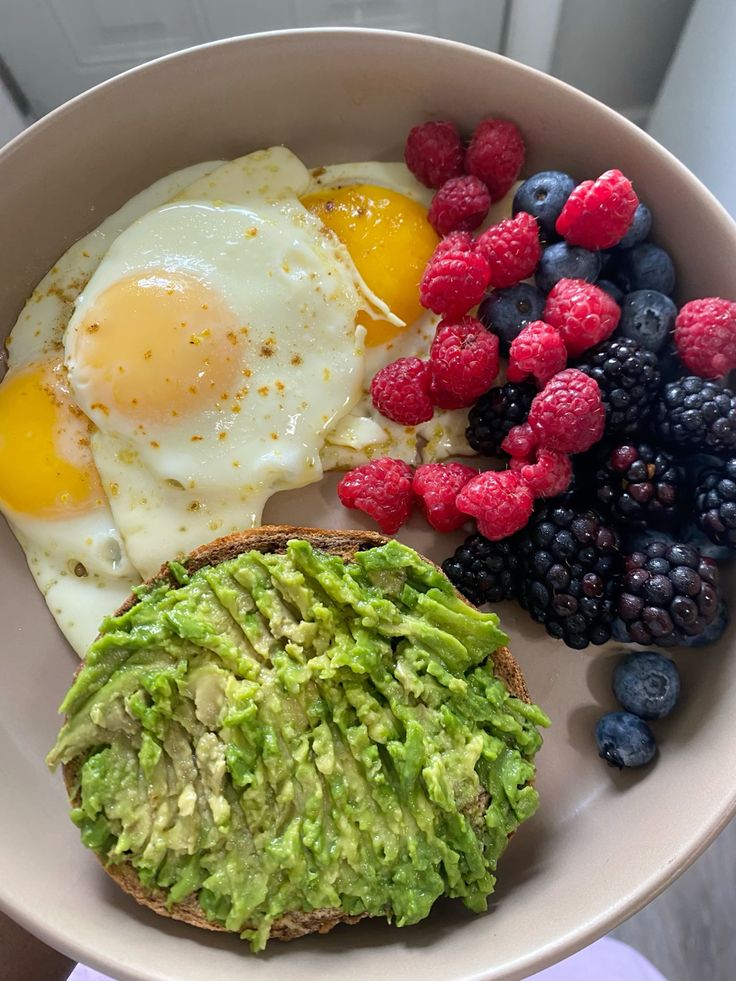
5. Smoked Salmon Bagel (Healthy Edition)
Protein: 26g | Calories: ~350 | Prep Time: 7 min
Skip the oversized bagels from the deli and go whole-grain mini bagel instead.
Ingredients:
- 1 whole-grain mini bagel
- 2 tbsp light cream cheese
- 3 oz smoked salmon (≈17g protein)
- Cucumber & red onion slices
- Fresh dill
Why It Works:
- Lean protein + healthy omega-3s
- Keeps blood sugar stable
- Satisfies savory cravings
Tip: Swap cream cheese for Greek yogurt spread to cut calories by 30%.
6. Tofu Scramble with Veggies & Spices
Protein: 18g | Calories: ~250 | Prep Time: 10 min
Perfect for plant-based eaters, a tofu scramble mimics scrambled eggs but gives you more fiber and zero cholesterol.
Ingredients:
- ½ block firm tofu (≈14g protein)
- ½ cup mushrooms & spinach
- 1 tbsp nutritional yeast (extra protein & B-vitamins)
- Turmeric, paprika, salt, pepper
Why It’s Great:
- Lower in fat than eggs
- Rich in iron and calcium
- High fiber = better satiety
Variation: Serve inside a whole-grain wrap for a portable breakfast burrito.

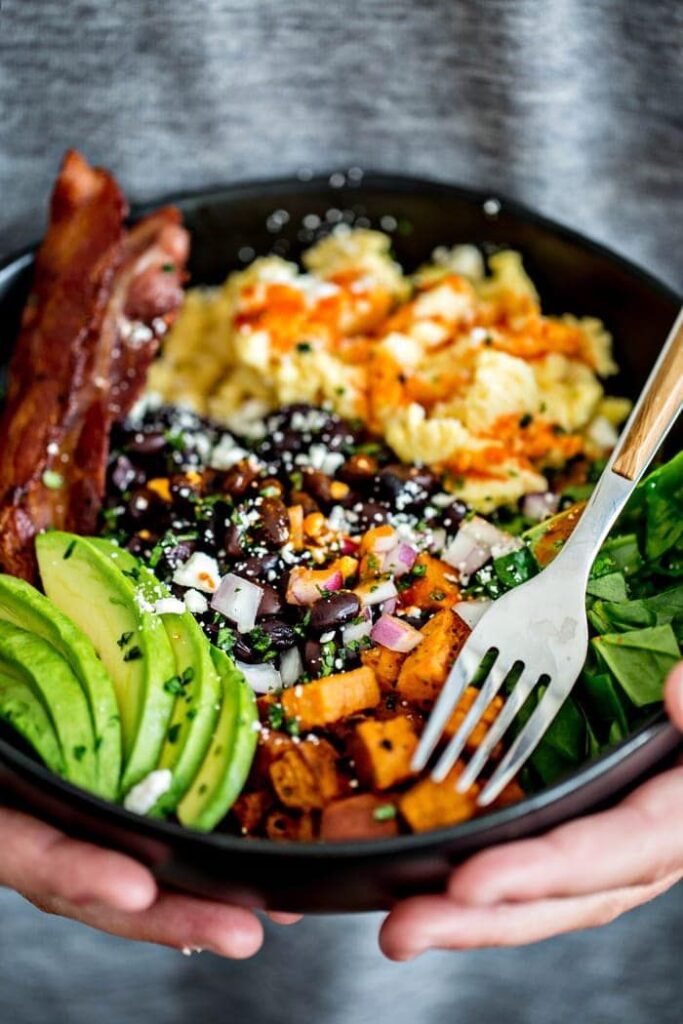
7. Cottage Cheese Power Bowl
Protein: 24g | Calories: ~280 | Prep Time: 5 min
Cottage cheese is making a huge comeback in 2025 thanks to its low-carb, high-protein profile.
Ingredients:
- 1 cup low-fat cottage cheese
- ½ cup pineapple or mango chunks
- 1 tbsp flaxseeds
- Sprinkle cinnamon
Why It Works:
- Excellent casein protein → keeps you fuller for longer
- Naturally low in carbs, perfect for keto-style plans
- High in calcium for bone health
8. High-Protein Cereal with Milk or Yogurt
Protein: 20g+ | Calories: ~250 | Prep Time: 2 min
Sometimes you just want cereal—but most cereals are loaded with sugar. Pick smarter brands instead:
Best Options in the U.S. (2025):
- Magic Spoon: 13g protein, 0g added sugar
- Catalina Crunch: 11g protein, keto-friendly
- Kodiak Granola: 12g protein, whole-grain oats
Tip: Pair with soy milk or Greek yogurt for an extra 8–10g protein boost.
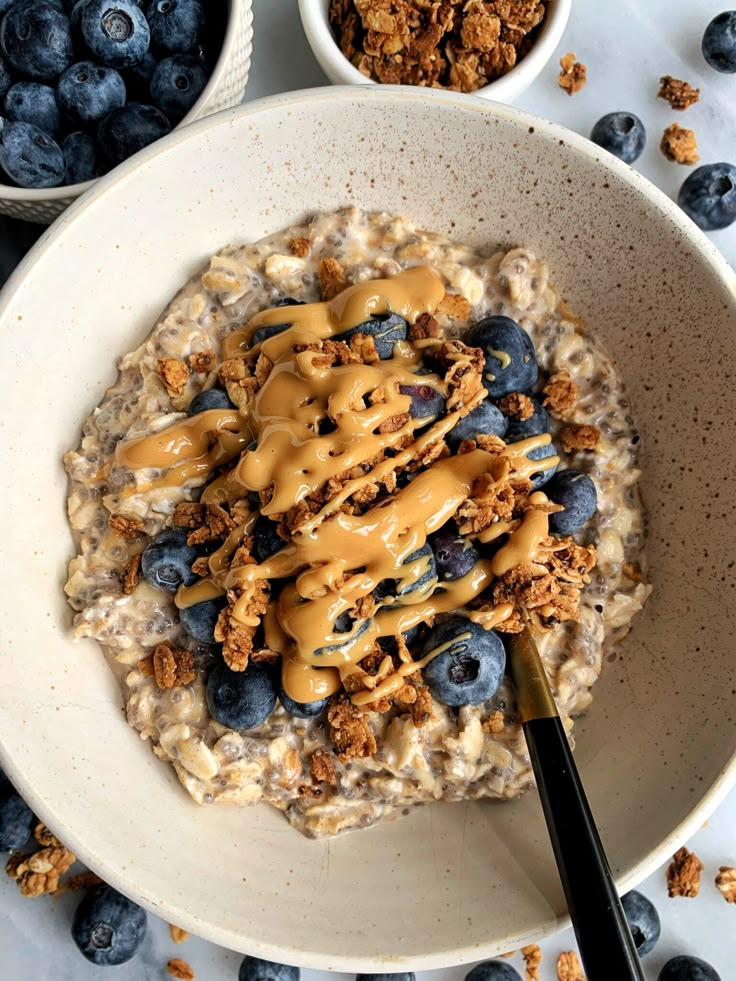

9. Quinoa Frittata or Egg Wraps
Protein: 27g | Calories: ~320 | Prep Time: 30 min
Quinoa isn’t just for lunch—it’s a complete plant-based protein that pairs beautifully with eggs.
Ingredients for Quinoa Frittata:
- ½ cup cooked quinoa
- 3 large eggs (18g protein)
- ½ cup chopped veggies
- ¼ cup feta cheese
Bake like a casserole or serve hot as slices.
Alternative: Use high-protein egg wraps filled with hummus, spinach, and smoked turkey for 27g+ protein in a handheld meal.
10. Peanut Butter Banana Protein Pancakes
Protein: 23g | Calories: ~330 | Prep Time: 15 min
Yes, you can have pancakes on a weight-loss plan—just make them smarter:
Ingredients:
- ½ cup rolled oats
- 1 ripe banana
- 1 scoop vanilla protein powder
- 1 egg
- 1 tbsp peanut butter
Why It’s Perfect:
- Naturally sweet → no added sugar needed
- Packed with fiber + protein
- Peanut butter adds healthy fats that keep you full
Pro Tip: Make extra and freeze them. Pop into a toaster when needed.
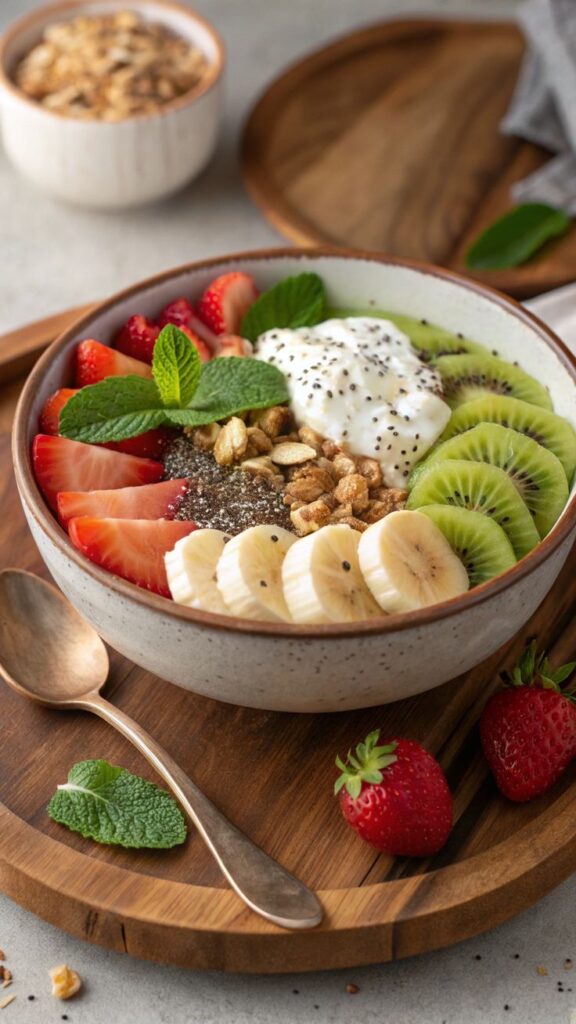
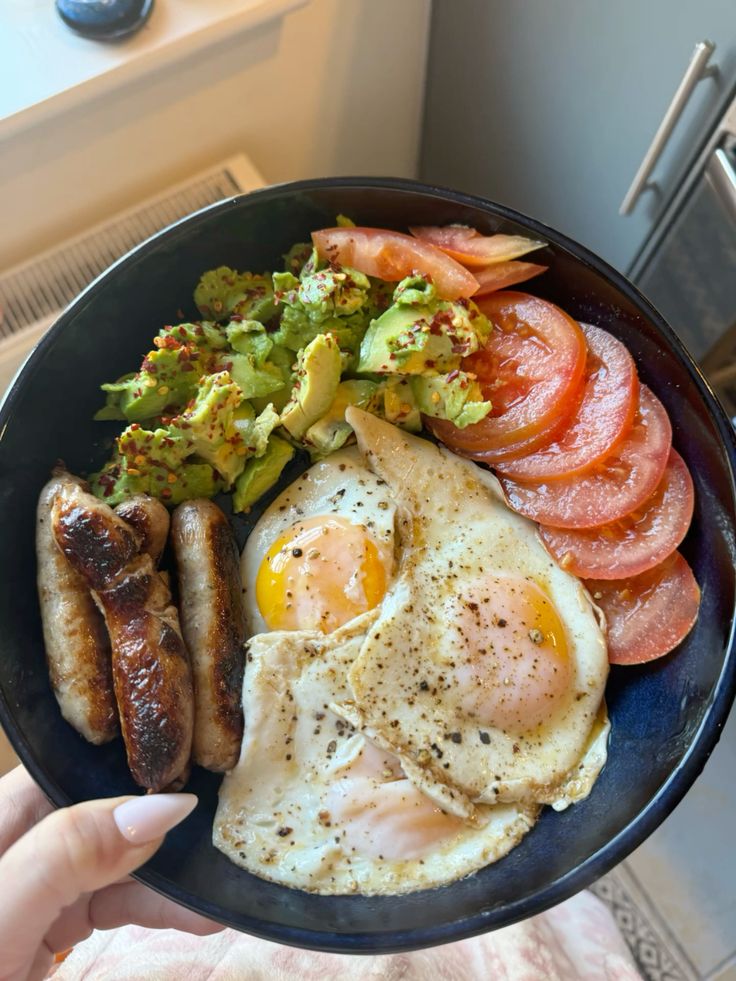
Expert Tips to Maximize Results
- Hit at least 20g of protein at breakfast for satiety
- Combine protein + fiber + healthy fats to stay energized
- Use portion control: aim for 300–350 calories per breakfast
- Stick to whole, minimally processed ingredients
- Prep ahead: batch cook, freeze, and plan your meals
Key Takeaways
| Tip | Why It Matters |
|---|---|
| Eat 20g+ protein per breakfast | Keeps you full, controls hunger hormones |
| Combine fiber + protein | Enhances satiety and stabilizes blood sugar |
| Prep in advance | Saves time and helps you stick to your goals |
| Pick minimally processed foods | Improves metabolism and long-term health |
| Keep variety | Prevents boredom and improves consistency |
Final Thoughts
Starting your day with a high-protein breakfast is one of the easiest, most effective habits for weight loss and overall well-being. Whether you’re into quick smoothies, grab-and-go muffins, or hearty frittatas, these 10 ideas give you flavor, flexibility, and lasting energy.
No more mid-morning cravings, no more energy crashes. You’re now set up for success—one protein-packed breakfast at a time.
FAQ — High-Protein Breakfast Ideas for Weight Loss
1. How much protein should you eat for breakfast to lose weight?
For effective weight loss, aim for 20–30 grams of protein at breakfast.
Research published in the American Journal of Clinical Nutrition (2024) found that breakfasts with at least 25g of protein improved satiety, reduced daily calorie intake, and supported fat loss.
Pro Tip: Combine protein + fiber + healthy fats for the best hunger control.
2. Are high-protein breakfasts better than low-carb ones?
Not always — it depends on your goals.
- High-protein breakfasts help curb cravings, boost metabolism, and maintain lean muscle.
- Low-carb breakfasts may be better for rapid weight loss, but without enough protein, you risk losing muscle mass.
For most people, a balanced approach — moderate carbs, high protein, healthy fats — works best.
3. Can I have a high-protein breakfast without eggs?
Absolutely! Here are egg-free options with 20g+ protein each:
- Greek yogurt parfait with protein granola
- Tofu scramble with spinach
- Protein smoothies or smoothie bowls
- Cottage cheese power bowls
- High-protein cereals with soy milk
Eggs are great, but not your only choice.
4. What are the best high-protein breakfast foods in the U.S. (2025)?
According to Google Trends and nutrition experts, here are the top-rated protein-rich breakfast staples:
- Greek yogurt (15–20g protein per cup)
- Cottage cheese (24g protein per cup)
- Protein powders (20–30g per scoop)
- Kodiak Cakes Power Flapjacks (14g protein per serving)
- Magic Spoon high-protein cereal (13g protein per serving)
5. Are high-protein breakfasts good for intermittent fasting?
Yes — if you follow 16:8 fasting or similar plans, breaking your fast with 20–30g of protein helps:
- Stabilize blood sugar
- Prevent post-meal crashes
- Extend satiety until your next eating window
A protein smoothie or Greek yogurt bowl is ideal after fasting.
6. Is a protein shake enough for breakfast?
Yes, but only if it’s balanced:
- Choose a high-quality protein powder (20–30g protein)
- Add healthy fats (e.g., nut butter, chia seeds)
- Include some fiber (e.g., spinach, oats, berries)
A plain protein shake may leave you hungry later, so add texture and fiber to stay full longer.
7. Can high-protein breakfasts speed up metabolism?
Yes! A 2023 study from the Journal of Nutrition & Metabolism found that higher protein intake increased diet-induced thermogenesis by up to 30% compared to low-protein meals.
That means your body burns more calories just by digesting protein.
